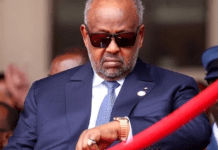On Monday this week (May 5), the United States finalized a new 10-year agreement with Djibouti for the use of the U.S. military base at Camp Lemonnier in Djibouti. The base, the only US base in sub-Saharan Africa, houses conventional forces, as well as Special Forces and aerial drones. The base has more than 3,000 U.S. civilian and military personnel. The new lease agreement will allow the U.S. to keep personnel and equipment at the camp for 10 more years and it also includes an option to extend the lease for an additional 10 years without renegotiation as well as a provision to extend for an additional 10 years at a renegotiated rate. According to reports the current agreement allows for a substantial increase of US$63 million a year for the use of the base.
 President Ismail Omar Guelleh of Djibouti who has been on a visit to Washington this week had a meeting with President Barack Obama at the White House on Monday. Discussions covered a range of security and development issues, but centered on the critical role played by Camp Lemonnier and its place as a hub for counterterrorism operations and training. President Obama described Camp Lemonnier as “extraordinarily important not only to our work throughout the Horn of Africa but throughout the region.” He said the base was “a critical facility’ and it could not be maintained without President Guelleh’s cooperation, adding “we’re grateful for him agreeing to a long-term presence there.” The major role of Camp Lemonnier as an operational headquarters for regional security was underlined as was its importance for protecting Americans and Djiboutians alike from violent extremist individuals and organizations. President Obama commended Djibouti’s important contributions to peace and security in Somalia, in AMISOM, through organizing of 12
President Ismail Omar Guelleh of Djibouti who has been on a visit to Washington this week had a meeting with President Barack Obama at the White House on Monday. Discussions covered a range of security and development issues, but centered on the critical role played by Camp Lemonnier and its place as a hub for counterterrorism operations and training. President Obama described Camp Lemonnier as “extraordinarily important not only to our work throughout the Horn of Africa but throughout the region.” He said the base was “a critical facility’ and it could not be maintained without President Guelleh’s cooperation, adding “we’re grateful for him agreeing to a long-term presence there.” The major role of Camp Lemonnier as an operational headquarters for regional security was underlined as was its importance for protecting Americans and Djiboutians alike from violent extremist individuals and organizations. President Obama commended Djibouti’s important contributions to peace and security in Somalia, in AMISOM, through organizing of 12
reconciliation conferences in support of peace-making efforts and its support for multinational efforts to counter piracy. The US is now going to provide enhanced security assistance and equipment to Djiboutian security forces including material for Djiboutian forces deployed with AMISOM.
The Presidents discussed ways that the U.S. presence at Camp Lemonnier could help further expand economic opportunities, and the Administration’s efforts to work with the U.S. Congress on the proposed “Djibouti First” legislation to allow preference to Djiboutian products and services in Department of Defense procurements in support of U.S. requirements in Djibouti. President Obama also said the US would continue to assist the government of Djibouti around issues related to human rights in the region, and find ways it could help Djibouti’s action plan for dealing with human trafficking. He said he looked forward to deepening cooperation that benefited the people of Djibouti. He underlined US support for Djibouti’s efforts to achieve its ambitious reform goals, its commitment to lowering unemployment, reducing poverty, and improving reliable access to energy, potable water, and health care. The US has pledged to increase technical and financial assistance and to invest in Djibouti’s development priorities. It will expand U.S.-sponsored workforce education and training, provide technical assistance to support Djibouti’s energy sector and work to catalyze private financing to develop renewable energy there. President Obama welcomed Djibouti’s commitment to empowering women and girls and promoting increased access to education and health services.
President Guelleh stressed his desire to achieve reinforced relations between Djibouti and the United States. He praised President Obama’s vision for the development of Africa and in general, and for the region in particular. He said Djibouti’s welcome for U.S. showed its support for international peace and for peace in the region, noting that in its work for peace in Africa, Djibouti was not only taking part in AMISOM, but was also present in Darfur, the Cote d’Ivoire, Western Sahara, and soon in the Central African Republic. He described the new agreement over Camp Lemonnier as a clear sign of Djibouti’s “support for international peace and for peace in our region”
The two presidents pledged to work closely together to advance their shared vision for a secure, stable, and prosperous Horn of Africa and to strengthen and deepen the strategic partnership between their two countries. Their meeting concluded with a shared commitment to a “special and longstanding relationship” and a pledge to continue to work to strengthen this strategic partnership. They agreed to establish a U.S.-Djibouti Bi-national Forum and designate senior officials to lead this to encourage implementation of the commitment to build a Strategic Partnership grounded “in friendship, mutual trust, and common security.”





I first thought this guy was going to change the world, but i am really disappointed in him. The guy is just weightless when he is meeting such small meaningless people, like Ismail Omer.